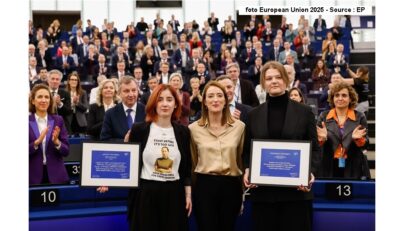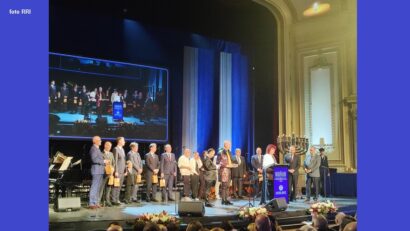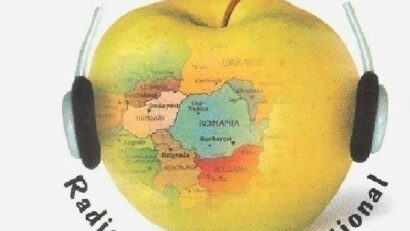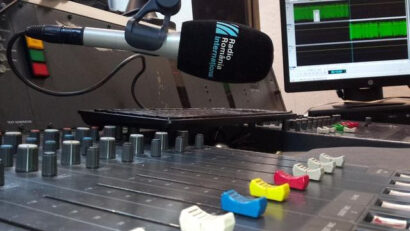LISTENERS’ DAY November 1, 2015
The refugee crisis
România Internațional, 01.11.2015, 15:00
Hans Verner Lollike, Denmark
“Last year we made holiday in the city of Weimar in Germany. As we always do, we did also visit the churches, that is open to guests and tourists. In one of the churches a rather old lady was one of the volunteers, that looked after the church. As we got to talk, she told us that she was born in Kaliningrad (Königsberg), and her mother fled with the children, they ended up in Copenhagen, Denmark, as 100,000 other Germans in the last days of the war. She told us, that her mother died in the refugee camp, lying in a mass grave in Copenhagen. We did feel bad, because we know, that the German refugees after WWII in Denmark were not treated with love, kept isolated and alive. Most of them did not have any part in the horror regime of Hitler. After WWII there was a terrible refugee situation on top of a smashed infrastructure in most of Europe. Have we forgot? In 1992 the civil war broke out in Yugoslavia, most severe in Bosnia. To Denmark came 17,000 refugees in few months. Close to where we lived, 4 centers were opened. We decided that we could not be friends with all of them, but we would try to find one family. We went to an open door arrangement and got some contacts, that ended up with the Lutfiu-family — Kosovo-Albanians — fleeing Serbian oppression. We are just a family to family friendship — visiting one another, helping out as friends do, participating in joys and sorrows. We are still very close friends after 23 years — and this year they invited us to Kosovo — to see their homeland. We did that in August! Now we know them a little bit better! Again Europe is flooded with refugees! I think we all are going to do our best! — so that all who are threatened on their life, can have a future here, but we can’t have all the poor people coming from all over the world, because they are poor! And how is it? Did the Thracians come once from Asia? Didn’t the Scandinavians come with the other German tribes from Asia — once back in history?”
John Cooper, PA, USA
“I have very strong mixed feelings about the refugee crisis/ migration into Europe and the USA. In todays world we tend to be told we absolutely have to be Politically Correct and not hurt others’ feelings. Im told that I must accept people, issues and norms that Im uncomfortable with. This is wrong and infringes on my rights.
A little background would help you understand. I was born and raised in a family where my father was in the military for 30 years. I was born in England as my father married an English citizen, my mother. My dad was stationed in France in the 1950s. I attended Kindergarten in France in 1957, and went through grades 3-6 in Germany, when my dad was stationed in Wurzburg. I was taught German at the American Elementary School in Wurzburg, as a mandatory subject.
I went into the military in 1971 and had three assignments to Germany. In late 1976 I was stationed in Wiesbaden, and 1979-1982 in Nuremberg, with my last tour being in 1983-1985 at Neu Ulm, the (former) Federal Republic of Germany. Unfortunately the Cold War was still going on, the two Germanies were separate and the Iron Curtain was still up.
Unlike many of my fellow American GIs I felt comfortable travelling, shopping, and living in Germany, and Europe. When I was allowed I always lived off the base I was assigned to. I found the people in Europe to be some of the finest human beings I ever met, and I made many friends because I tried to use the language, and I got involved in activities and customs of the host country I was stationed in.
I saw in Germany first hand how the Turkish Arbeitwerkers and some other immigrants did not assimilate into German society as it was said they were expected to. They basically stayed in their own communities, learned very little German and continued to practice their form of Islam.
I practice my own religion but it does not control all my thoughts or actions everyday. It seems that Islam does not allow some freedoms we take for granted in the ‘Free World!’ Nor does it allow for you to accept different belief systems as I have been taught to do. If someone burns or desecrates a Bible in front of me I would not harm them or call for their death. Sure I would be mad but thats as far as it would go.
The refugees coming into Europe need to assimilate into European Society fully which means accepting the norms, culture, lifestyles and customs of where they live and strive to integrate into the host country which is paramount towards success. This will not happen with Islamic refugees. It also seems to me like people who are so much in fear of their life sure seem to be choosy on where they want to live instead of being happy in any country they are safe in.
Normally this process happens starting with the second and third generation of children from the original parents who immigrated. Europe and any country who allows these people into their countries are setting themselves up for untold problems in the future.
I would like to finish by saying I enjoy listening to RRI and its fantastic English language programming. Listening makes me want to travel to Romania and sample the places I have learned about. Thank you for your programs.”
Ferhat Bezazel, Skikda, Algeria
“I think the refugee crisis, that Europe is facing, is not a new or a modern phenomenon, because immigration from Africa to Europe, via Italy and Spain, is an old phenomenon. However, I think, first of all, of the complexity of the problem and the numerous questions it raises. In my opinion, the most important one is why such people decided to leave their homeland to go to live in a foreign country. The reasons are many and complicated, with insecurity and poverty being among the main reasons. I would like to share with you my own story with the boats of death. In October 2007, I decided to go illegally in a small boat of only ten meters, together with some friends of mine, in an effort to reach the Italian coast. At that time, I foolishly decided to face the waves of the Mediterranean Sea, because all doors of hope seemed closed to my eyes. I am young, I have no work, nor money to live with, and the future is black in my country, Algeria. Furthermore, I live in a small village where terrorist attacks were taking place on a daily basis and people died every week. So, I was living in an atmosphere of fear and poverty. That’s why I took the risk to go to Europe, in search of work. At that time, my own safety and security were not an important question for me. I never thought I might die at sea, as my only dream was to reach the Italian coasts by all means. The journey was like hell: we spent more than 15 hours without food or water at high sea. In the end, we were rescued by an Algerian commercial ship. It was like a nightmare, but I wanted so much to go to Italy, as a refugee. Now I live in Algeria, but nothing has changed. I live in poverty and it is hard to lead a decent life. Right now, I am 35 years old, but I can’t get married and I can’t have a house. I think the refugee crisis in Europe will never end, because theres no democracy, nor chances of leading a decent life in the most countries in Africa or the Middle East. In an effort to find a possible solution, maybe Europe should help the African countries create a stable economy and equal chances to work in the poor countries of the region. In the end, I would like to say that refugees are humans, too, and the European countries should treat them as humans in need.”
David Clarke, St Helen Island
”It brings tears to our eyes when watching the TV and see the plight of the refuges, poor souls, especially the little children and infants. It is hard to believe that this is really happening in the outside world. It is quite apparent that this is a tremendous strain on the resources of the countries involved. We live on this island of 47 square miles, in the middle of nowhere, as they say, where there is peace and tranquillity. If this happened here, we would have insurmountable problems because we are grant-aided by Britain (…), although the island is steeped in history. Weeks ago, on October 15th 2015, the island celebrated the 200th anniversary of the arrival of Napoleon”.
Mitul Kansal, Haryana, India
”The Syrian conflict has devastated the nation, more than 24,000 people have been killed, including 12,000 children. One million others have been wounded or left disabled. Nearly 12 million Syrians, half of them children, have been forced by fighters to leave their homes. At least 7.6 million have been displaced within Syria. And more than 4 million have fled as refugees in neighbouring countries. Children affected by the Syrian conflict are at risk of becoming ill, malnourished, abused or exploited. Millions have been forced to quit schools. Refugees are fleeing to the neighbouring countries of Lebanon, Jordan, Iraq and further away, to Germany, Serbia, Hungary, Turkey etc. (…) The refugees need food, clothing, health assistance, shelter, basic household and hygiene items. They need a reliable supply of clean water as well as sanitation facilities. As the winter is coming, they also need warm clothing, heaters etc. Children need a safe protective environment and a chance to go to school. Adults need employment options in case of long-term displacement.(…)It’s difficult for parents to afford books, uniforms, tuition fees for their children. In response to the wave of migration towards Europe, I think, today there is a great need of selfless persons who can provide a helping hand to them and create an atmosphere of hope for refugees. We may have different religions, we may have different languages, we may have different skin color and we may belong to different regions, but one thing is definite and true, we are all belonging to the same human race.”
Khalil Abdel Kader, Algeria
“The refugee crisis now facing Europe is not new, it started several decades ago, when young people from African and Middle Eastern countries left for Western Europe in search of a better life. But the conflicts in these regions, especially the war in Syria, have boosted the migration phenomenon, turning it from individual migration, as it was several decades ago, into collective migration, through which people are trying to escape the consequences of war, poverty and death. However, I believe that the fact that some refugees were happy to be well received in some European countries led to an increase in the migration flows to these countries, the refugees preferring these states to the neighbouring Arab states where the living standard is lower than in Europe. I think that choosing the west and the north of Europe is not beneficial for most refugees, because Europe is itself facing an economic crisis. Furthermore, the western way of living, which is totally different from that in their countries of origin, makes their social integration very difficult. It is true that, for humanitarian reasons, it is necessary to accept the challenges emerged against the backdrop of the refugee crisis, but we also have to think of the future. Maybe the European Union should negotiate solutions for the refugees with some countries outside Europe, especially with the Arab states that have a better economic situation, like Algeria and the Gulf countries, in the sense of hosting certain quotas of refugees. Although I am convinced that, irrespective of the country they come from, the refugees want to settle in Europe. I wish wars would end and the situation in the refugees’ home countries would improve, so that the phenomenon of collective migration should subside and people should be able to have a better life in their own countries.”
Simon Rudd, Manchester, UK
“I have a special feeling for migrants as I’ve never really felt at home in my resident country. If one is to be prepared to travel so as to improve one’s life and to be prepared to contribute to another culture and people, then one should be given the opportunity. As for mine own countrys policy of limited immigration, the UK has limited resources especially within our policy of cutbacks and efforts towards economic surplus”.
Shahzad Shabbir, Chichawatni, Pakistan
“The Syrian civil war has created more than four million refugees. What’s holding back sympathy for the Syrians? They’ve been barrel-bombed in Aleppo by their own regime, they’ve been tortured, kidnapped and massacred by miscellaneous Jihadists and opposition militias. They’ve been in refugee camps for years, waiting for (…) the international community to come to their aid. Now, when they take to the roads, to the boats and to the trains, all our political leaders can think of is…. fences, barbed wire and more police. But this is the real challenge: is German society ready and willing for such a fundamental upheaval, one that will touch on all aspects of peoples lives? It is important to know that the experiment cannot be terminated, even if it fails. That means, decisions are being made today that will have repercussions for generations. And even those who do not regulate what is happening, like the Germans at the moment, are still taking decisions nonetheless. It is time to take control again.”
Madhav Garg, Ambala City, India
“I am a new listener to RRI’s programs and I am very happy to learn that RRI is hosting a forum for its listeners on the subject of the ‘refugee crisis.’ Due to the Syrian conflict, millions of Syrian people have been forced to leave Syria, where thousands of children have been killed. Thousands fled the country and headed for Lebanon, Jordan, Turkey, Serbia, Hungry, Germany or Iraq, for example. They are living in camps and those who don’t pay high rents for accommodation and others. They have no income sources. The future of their children is very dark. They cannot go to school. So jobs should be created for them, and they should be provided with basic need facilities. We are human beings, and it is our moral duty to provide a helping hand, to heal their wounds”.

